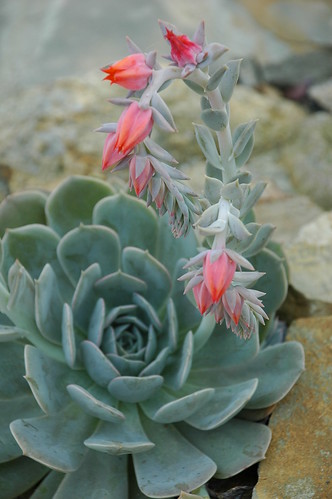Today was our day to visit the North Carolina Arboretum. CC accompanied me for about half of the photos I took. It was a pleasure to be able to explore the Arboretum with another plants-person. It’s been too long since I had the opportunity to do so.
Here are some photographic highlights of my visit. You can see even more photos of my visit on Flickr.
Annuals in Container
This is a detail view of one of the many combinations of annuals and other tender plants in containers around the plazas and promenade at the Arboretum. The plants here are:
- Upper left: Golden Pineapple Sage, Salvia elegans “Golden Delicious”
- Upper right: Coleus, Solenostemon scutellarioides “Coco Loco”
- Lower center: Shamrock, Oxalis vulcanicola “Zinfandel”
It was interesting walking around with CC for this, since he’s familiar with many of our “annuals” as year-round landscape plants. He recognized the Pineapple Sage immediately; I thought it was another Coleus.
Here’s a full-on view of this container and its neighbors.
And here’s that Begonia with its companions.
Pipsissewa (Chimaphila umbellata), on the Nature Garden Walk.
Flower of Franklinia alatamaha in the parking lot.
Bark of Black Gum (Nyssa sylvatica), on the Nature Garden Walk
Tiger Swallowtail on Hydrangea off the promenade.
Lichens on Rock, Nature Garden Walk
Three-lobed Coneflower (Rudbeckia triloba), handicapped parking area

The beauty above is Scolia dubia, also known as a Flower, Digger or Blue-winged Wasp. Thanks to nafensler (Flickr) for the ID! I photographed this in the parking lot as CC and I were leaving the Arboretum. NCSU’s Center for Integrated Pest Management has an apt write-up from a couple years ago:
Scolia dubia is a black-colored insect with metallic blue highlights on the wings and thorax. The brownish abdomen has two yellow spots near the middle of the abdomen and the tip is a red-brown color. Scoliid wasps are considered beneficial insects because they help control the grubs of green June beetles and other beetles. They are present in North Carolina from June to October, but they are most abundant during August. The wasps are often seen hovering a few inches above lawns, flying in loops and Figure 8 patterns. The female wasp digs through the soil in search of grubs, burrowing her own tunnels or following those made by the grubs. These are not a stinging threat to humans and no control measures are suggested.
Related Posts
Quilt Garden
Baker Exhibit Center





I’m from N.C. and I remember visiting Pisgah National Forest when I was a teen. The plants look gorgeous! You’ve made me homesick…
I really must get a better camera. Your pictures are wonderful Xris.
Great pics. Why did I never visit this garden when I lived in NC?
Thanks for visiting us at TNCA! Your pictures are beautiful, and your blog is great too. I’m the PR Coordinator here at the Arboretum, so I see many blogs that get posted out there in the world. Yours is fabulous. Thanks again!